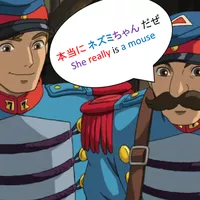本当に ネズミ ちゃん だ ぜ
ほんとうに|ねずみ|||
You're really a mouse
Realmente eres una rata.
Tu es vraiment une souris
Você é realmente um rato
你真的是一只老鼠
何 か お 探し かな 小 ネズミ ちゃん
なん|||さがし||しょう|ねずみ|
Suchen Sie etwas Kleine Maus
Are you looking for something little mouse?
¿Qué puedo hacer por ti, ratoncito?
Cherches-tu quelque chose petite souris
Você está procurando algo ratinho
いやの ご 心配 なく
いや の||しんぱい|
No, Don't worry (about me).
No, no te preocupes.
Ne t'en fais pas
Não se preocupe
不用担心
では お茶 など いかがでしょう
|おちゃ||
Then how about some tea?
¿Qué tal una taza de té, por ejemplo?
Alors que diriez-vous d'un peu de thé?
Então que tal um chá?
那来杯茶怎么样?
お付き合い願います か
おつきあい ねがいます|
Möchtest du dich treffen
Would you like to meet?
¿Te gustaría venir?
aimeriez-vous rencontrer
você gostaria de conhecer
你想要见面吗
用事 が あります ので
ようじ|||
I have business
Tengo algunos asuntos que atender.
j'ai une entreprise
eu tenho um negócio
我有事
本当に 子ネズミ ちゃん だ ぜ
ほんとうに|こ ねずみ|こ|ねずみ|
She really is a mouse
Realmente eres un ratoncito.
C'est vraiment un bébé souris
Você é realmente um rato
你真的是一只老鼠
ね 君 いくつ ? この 町 の子?
|きみ|いく つ||まち|
Hey, wie alt bist du? Kommst du aus dieser Stadt?
How old are you? Are you from this town?
¿Cuántos años tienes? ¿Eres de aquí?
Hey, quel âge as-tu ? Tu es de cette ville ?
Ei, quantos anos você tem? Você é desta cidade?
你多大了?你是这个镇上的人吗?
通して ください
とおして|
Please let me through
por favor passe
请通过
ほら お前 の 髭 面 の せい だ ぞ
|おまえ||ひげ|おもて||||
Schau, es ist wegen deinem Bart.
See, it's because of your facial hair.
Olha, é por causa da tua barba.
看,这是因为你的胡子。
怒った とこ も 可愛い じゃ ないか
いかった|||かわいい||ない か
Aren't you cute when you're angry?
Não é fofo quando ele está com raiva
生气的时候是不是很可爱
いや ーごめん ごめん
|- ごめん|
Sorry, Sorry
não desculpe desculpe
对不起,对不起
探した よ
さがした|
I searched (for you).
eu pesquisei
我搜索过
なんで お前 は この 子 の 連れ さ
|おまえ|||こ||つれ|
Why are you with this child?
Por que você está com essa criança
你为什么和这个孩子在一起
君 たち ちょっと 散歩 して きて くれ ない か
きみ|||さんぽ|||||
Can you guys take a walk for a while?
Vocês podem dar uma volta um pouco?
你们可以走一小段路吗?
